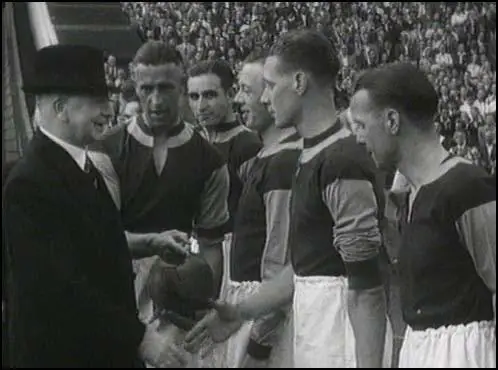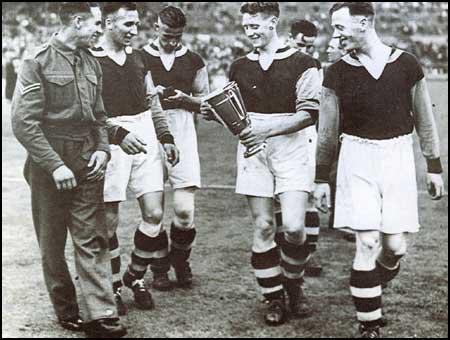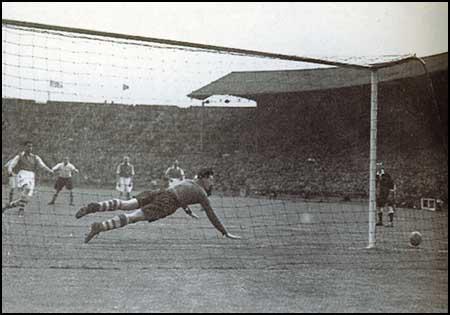Football League War Cup
On Friday, 1st September, 1939, Adolf Hitler ordered the invasion of Poland. The football that Saturday went ahead as Neville Chamberlain did not declare war on Germany until Sunday, 3rd September. The government immediately imposed a ban on the assembly of crowds and as a result the Football League competition was brought to an end. Blackpool, who had won all three games so far that season, was top of the First Division table at the time.
On 14th September, the government gave permission for football clubs to play friendly matches. In the interests of public safety, the number of spectators allowed to see these games was limited to 8,000. These arrangements were later revised, and clubs were allowed gates of 15,000 from tickets purchased on the day of the game through the turnstiles.
The government imposed a fifty mile travelling limit and the Football League divided all the clubs into seven regional areas where games could take place. London clubs arranged for their regional competition to begin on the last Saturday in October. One group was composed of Arsenal, Brentford, Charlton, Chelsea, Fulham, Millwall, Tottenham Hotspur and West Ham United. The other group included Aldershot, Brighton, Clapton Orient, Crystal Palace, Leyton Orient, QPR, Reading, Southend and Watford.
After the declaration of war in September 1939, Adolf Hitler did not order the attack of France or Britain as he believed there was still a chance to negotiate an end to the conflict between the countries. This period became known as the Phoney War. As Britain had not experienced any bombing raids, the Football League decided to start a new competition entitled the Football League War Cup.

The entire competition of 137 games including replays was condensed into nine weeks. However, by the time the final took place, the "Phoney War" had come to an end. On 10th May, 1940, Adolf Hitler launched his Western Offensive and invaded France. In the days leading up to the final, the British Expeditionary Force was being evacuated from Dunkirk.
In the final held at Wembley on 8th June, 1940, West Ham United beat Blackburn Rovers 1-0. Despite the fears that London would be bombed by the Luftwaffe, over 42,300 fans decided to take the risk of visiting Wembley. The only goal was scored by Sam Small after a shot from George Foreman had been blocked by James Barron, the Blackburn goalkeeper.

Left to right, Corporal Norman Corbett, Ted Fenton, Charlie Bicknell,
Archie Macaulay and George Foreman.
The Luftwaffe carried out its first bombing raid of London on 10th July, 1940. During the Battle of Britain clubs continued to play football. On 19th September, 1940, soon after the beginning of the Blitz, the Football Association relaxed their ban on Sunday football to provide recreation for war workers.
Between September 1940 and May 1941, the Luftwaffe made 127 large-scale night raids. Of these, 71 were targeted on London. The main targets outside the capital were Liverpool, Birmingham, Plymouth, Bristol, Glasgow, Southampton, Coventry, Hull, Portsmouth, Manchester, Belfast, Sheffield, Newcastle, Nottingham and Cardiff. Some two million houses (60 per cent of these in London) were destroyed and 60,000 civilians were killed and 87,000 were seriously injured. Of those killed, the majority lived in London.
The Blitz was still taking place when the 1941 Football League Cup competition took place. Preston North End beat Bury, Bolton, Tranmere, Manchester City and Newcastle to reach the final. The Preston team that faced Arsenal at Wembley on 31st May was: Jack Fairbrother, Frank Gallimore, William Scott, Bill Shankley, Tom Smith, Andrew Beattie, Tom Finney, Andrew McLaren, Jimmy Dougal, Robert Beattie and Hugh O'Donnell.
Preston North End played Arsenal in front of a 60,000 crowd. Arsenal was awarded a penalty after only three minutes but Leslie Compton hit the foot of the post with the spot kick. Soon afterwards Andrew McLaren scored from a pass from Tom Finney. Preston dominated the rest of the match but Dennis Compton managed to get the equaliser just before the end of full-time.

Leslie Compton (Arsenal) during the 1941 Football League Cup Final.
The replay took place at Ewood Park, the ground of Blackburn Rovers. The first goal was as a result of a move that included Tom Finney and Jimmy Dougal before Robert Beattie put the ball in the net. Frank Gallimore put through his own net but from the next attack, Beattie scored again. It was the final goal of the game and Preston ended up the winners of the cup.
